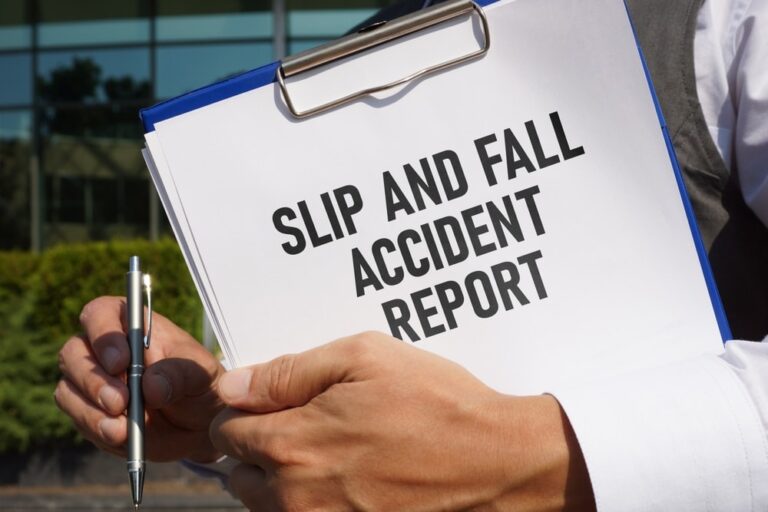Key Takeaways:
- Personal injury claims rely on proving negligence, including duty of care, breach, and causation.
- Compensation may cover medical bills, lost wages, pain and suffering, property damage, and wrongful death.
- Severity of injuries, from whiplash to traumatic brain injuries, affects the value of a claim.
- Evidence like photos, medical records, accident reports, and witness testimony is crucial to establish liability.
- Hiring an experienced personal injury attorney ensures proper guidance, protects your rights, and maximizes compensation.
When your life is radically turned upside down by a devastating injury, the quest for justice and the need for support becomes more than just a legal matter; it becomes a lifeline. If you’re grappling with the haunting question, “Do I have a valid personal injury claim?” and have suffered from injuries, you’re not alone.
Turning to a reliable attorney and their devoted team is crucial in these trying times, the right attorney can offer you the expertise and genuine care you need to walk this challenging path with confidence and support. If you are asking this question and don’t know who to turn to, consider reaching out to Pemberton Personal Injury Law Firm for a free case evaluation. We will walk this journey with you, so you don’t walk it alone.
We are going to cover many different factors that can contribute to the validity of your personal injury claim. Seeking guidance is pivotal and educating yourself will have a profound impact on your mindset when entering a personal injury case. Regardless of whether it’s your first, second, or even fifth time entering the realm of personal injury, acquiring knowledge can empower you to take that initial step and give you some comfort in doing it.
What Effect Does Negligence Have in a Personal Injury Case?
Negligence is a central concept in personal injury claims, because it refers to the failure of an individual to exercise reasonable care, resulting in harm or injury to another person. How negligence affects a personal injury case is a valuable process of understanding, especially if you are either involved with a case or looking into one.
Establishing Liability:
- Establishing liability in a personal injury claim involves proving who is responsible for the harm or injury that occurred. It’s about determining who failed to take proper care, leading to the injury. Negligence is the legal standard used to determine which party breached their duty of care.
Duty of Care:
- The concept of duty of care is as straightforward as it sounds. It entails a legal responsibility for individuals to exercise reasonable and prudent behavior in situations where their actions could potentially harm others. The specifics of this duty can vary depending on the circumstances. For example, a driver has a duty to operate their vehicle safely to prevent accidents.
Breach of Duty:
- Proving another party breached their duty of care is significant to establishing negligence for your case. To verify negligence, you must show that the other party breached their duty of care. You can do this by demonstrating that the defendant’s actions fell below the standard care that a reasonably prudent person would have exercised in the same situation. In other words, they failed to meet their legal obligation to prevent harm.
Causation:
- Negligence alone is not enough to prove a personal injury case. You must also establish a causal connection between the other party’s breach of duty and the injuries they suffered. You must demonstrate that your defendant’s actions were a direct or proximate cause of your injuries.
Comparing Negligence:
- In some cases, both you and the other party may share some degree of fault for the accident or injury. Many states follow a comparative negligence system, where damages are divided based on each party’s degree of fault. If you are found partially negligent, your recovery may be reduced accordingly.
Impact on Damages:
- The level of negligence attributed to another party can significantly impact the damages awarded in a personal injury case. The more negligent their actions are, the greater the potential compensation for you, including medical expenses, pain and suffering, lost wages and other losses.
Role of Evidence:
- Evidence such as eyewitness testimonies, accident reports, medical records, expert opinions, and other documentation is crucial in proving negligence and establishing liability in a personal injury case.
To summarize, Personal injury cases hinge on negligence as a foundational element, as it lays the groundwork for determining whether someone bears legal responsibility for another person’s injuries. If a plaintiff can convincingly prove that the defendant acted negligently and that this negligence led to their injuries, they may have the right to seek compensation for their losses.
Is My Case Still Valid if the Negligent Party Doesn’t Have Insurance?
Frequently, individuals find themselves in situations where the other party lacks insurance, regardless of the nature of the injury. In such instances, it becomes necessary to examine your insurance and evaluate the extent of your ‘uninsured coverage.’ This alerts you to the importance of having your insurance, it ensures you have protection, particularly when an accident is not your fault. For example:
Uninsured Motorist Coverage:
- If you have uninsured motorist coverage (UM), it can help cover your medical expenses and property damage when the at-fault driver doesn’t have insurance.
Underinsured Motorist Coverage:
- If the negligent driver’s insurance coverage is insufficient to cover your expenses, your underinsured motorist coverage (UIM) can bridge the gap, ensuring you receive adequate compensation.
Medical Payments (MedPay):
- These coverages can help pay for your medical bills, regardless of fault, and can be used if the at-fault driver is uninsured or underinsured.
Collision Coverage:
- This coverage helps repair or replace your vehicle, even if the other driver is uninsured, provided you have collision coverage on your policy.
It’s essential to review your insurance policy and consult with your insurance provider to understand the specific coverages you have and their limits to ensure you are adequately protected in the event of an accident with an uninsured or underinsured driver.
Some states operate under a ‘no fault’ system, however, Wisconsin is not among them. If you live in a state that works under the ‘no fault’ system, you may qualify for Personal Injury Protection. It follows the same guidelines as MedPay.
What Compensation Options Can I Seek in a Personal Injury Claim?
There are various types of compensation you can seek for a personal injury claim, depending on the specifics of your case and the applicable laws in your jurisdiction. Common types of compensation include:
Medical Expenses:
- This covers the cost of medical treatment related to your injury, including hospital bills, surgery, medication, rehabilitation, and future medical expenses.
This is a tremendous source of relief when a personal injury law firm like Pemberton steps in. Pemberton Personal Injury Law Firm does well to ensure that you don’t have to contend with insurance companies.
Lost Wages:
- If your injury results in time off work or reduces your earning capacity, you can seek compensation for lost wages, including past and future income.
If you’ve experienced any lost wages, this factor could significantly impact your personal injury claim. The extent to which you lose income as a result of an accident caused by someone else can be life-changing, affecting your financial stability within your career, your family, and your home.
Pain and Suffering:
- Pain and suffering compensation accounts for the physical and emotional distress caused by the injury, including pain, anxiety, and loss of enjoyment of life. Following a major injury, we empathize with you if you’ve experienced any anxiety, sleep disruption, and pressure managing a multitude of appointments. Moreover, we recognize the emotional and physical distress that can arise while trying to perform everyday tasks that were once routine, and any reduced ability to fully enjoy your family.
You deserve to be compensated for your pain and suffering after your life has been turned upside down, and we want to help you achieve that.
Property Damage:
- If your personal property, such as your vehicle was damaged, in a car accident, you can seek compensation for repair or replacement costs.
Loss of Consortium:
- In some cases, a spouse or family member may be able to seek compensation for the loss of companionship, support, or care due to your injury.
Punitive Damages:
- In cases of extreme negligence or intentional harm, the court may award punitive damages to punish the responsible party and deter similar conduct in the future.
- If a personal injury results in a fatality, surviving family members may seek compensation for funeral expenses, loss of financial support, and emotional distress through a wrongful death claim.
Devastating doesn’t begin to cover how it feels to lose a loved one. Finding a compassionate lawyer who understands the pain you’re experiencing can make a world of difference for you when pursuing a personal injury claim.
The specific types and amounts of compensation you can seek will depend on the circumstances of your injury, the severity of your losses, and the laws in your jurisdiction.
Does the Severity of My Injuries Matter?
Severe to moderate injuries are important in personal injury claims because they often lead to significant damages. Victims seek compensation to cover medical expenses, lost income, pain, and suffering, and other losses resulting from their injuries, and to ensure they receive necessary care and support for their recovery. For example:
Severe:
Traumatic Brain Injury:
- Severe brain injuries can have long-lasting effects on cognitive function, emotional well-being, and physical capabilities. These injuries often require extensive medical treatment, and rehabilitation, and may result in permanent disability, impacting the victim’s quality of life.
Spinal Cord Injury:
- A spinal cord injury can lead to paralysis or significant impairment, necessitating ongoing medical care, mobility aids, and home modifications. These injuries often have high medical costs and a profound impact on the victim’s daily life.
Amputations:
- Loss of a limb can result in substantial medical expenses, prosthetic limb costs, and rehabilitation. This is a permanent disability that can affect the victim’s ability to work and perform daily tasks.
Burn Injuries:
- Burns can lead to disfigurement, physical pain, and emotional trauma. Personal Injury claims involving burn injuries often seek compensation for extensive medical treatment, plastic surgery, and psychological counseling.
Psychological Trauma:
- Severe emotional distress, such as post-traumatic stress disorder (PTSD) or depression, resulting from the accident or injury, is important in a personal injury claim. These claims may seek compensation for therapy, counseling, and the impact on the victim’s Overall Well-being.
Here’s a list of injuries that are moderate but may still impact your life significantly thus making it still a compensable claim.
Moderate:
Whiplash:
- Whiplash is a common injury in car accidents and can result in neck pain, stiffness, and limited range of motion.
Sprains and strains:
- These injuries involve damage to muscles, ligaments, or tendons, often due to slips, trips, or falls.
Contusions and Bruises:
- Contusions and bruises are common injuries resulting from blunt force trauma, such as from car accidents or falls.
Fractures:
- Extensive bone fractures may require surgeries, physical therapy, and may result in permanent impairment. These injuries are significant in personal injury claims because they can lead to substantial medical bills and loss of income.
Cuts and Lacerations:
- Injuries involving cuts and lacerations may lead to scarring or infection and can be pursued in a personal injury claim.
We also have to measure how much treatment you receive, how frequent, how much it is affecting your life, and what the long-term effects are. All of these are contributing factors to your case. However, no matter the severity you feel your injuries, getting a case evaluation from an attorney will benefit you and your family.
Is Evidence Necessary for a Personal Injury Claim?
 To establish a successful personal injury claim, you must provide evidence to prove your case. This is partially crucial because the majority of states operate under a ‘fault’ system, wherein the court determines the liability and the extent of compensation based on the party found to be at fault. Evidence serves as a means to demonstrate your cautious reasoning and establish the negligence of the other party.
To establish a successful personal injury claim, you must provide evidence to prove your case. This is partially crucial because the majority of states operate under a ‘fault’ system, wherein the court determines the liability and the extent of compensation based on the party found to be at fault. Evidence serves as a means to demonstrate your cautious reasoning and establish the negligence of the other party.
Now that we’ve discussed why evidence is essential in a personal injury case, let’s explore the various types of evidence that play a critical role in building a strong case.
Photographs of Injuries and Damages:
- Photographic evidence of injuries is invaluable. These images offer a compelling and tangible representation of your injuries, helping to provide a clear and persuasive account of the harm suffered, which can significantly strengthen the case.
- Photographs and videos capturing damages resulting from incidents like car accidents, dog bites or slip and falls are central to a personal injury case for several reasons. They serve as tangible visual evidence, allowing the court or jury to directly witness the scene, injuries, and property damage. For example, if a witness had a dash cam on their car and recorded your crash, that would be monumental evidence for your case.
Witness Testimony:
- Witness testimony holds great importance in personal injury cases. It provides firsthand accounts and perspectives on the incident, helping to corroborate your claims, establish liability, and offer valuable insights into the extent of the injuries and their impact on your life.
Accident Reports:
- Police reports and incident reports prepared by authorities can provide an objective account of the accident, including any citations or charges filed against the defendant.
Medical Records:
- Medical records, including doctor’s notes, test results, and treatment plans, serve as crucial evidence to demonstrate the nature and the extent of your injuries and the associated medical expenses.
Documentation of Expenses:
- Receipts, bills and financial records can serve as evidence to quantify the economic damages, including medical bills, lost wages, and property damage.
How Do I Find the Right Personal Injury Attorney for My Claim?

Selecting the right attorney for your personal injury claim is imperative, not only for your sake but also for the well-being of your family. Contact an experienced and knowledgeable attorney who can provide expert guidance, navigate the complexities of the legal system and tirelessly advocate for your rights and interests, ensuring that you and your family receive the compensation and justice you deserve during a challenging season.
Identify your needs:
- Identifying your needs for a personal injury case involves a thoughtful and comprehensive assessment of your situation to ensure you have the right legal support and recourses. Observe the specifics of your case including the type of injury, the circumstances, and your desired outcome. This information will help you to know whether you need to seek help from an attorney.
- If you’re uncertain and undecided, consider taking advantage of the free case evaluation offered by Pemberton Personal Injury Law Firm; it’s readily available and carries no risks.
Experience:
- Hiring an attorney with extensive experience in personal injury cases is crucial because their expertise equips them with an in-depth knowledge of the intricacies involved in such matters. This experience not only enhances their ability to navigate the legal system effectively but also ensures they can advocate vigorously for your rights, maximize your potential compensation, and provide invaluable guidance during what can be a challenging and emotional time.
Read Reviews and Testimonials:
- When evaluating a company’s reputation, nothing beats the insight provided by genuine client reviews, offering an authentic perspective on their experiences. This is a great way to decide who you choose to represent you for your personal injury claim.
To find the best personal injury attorney, you will need diligence and patience. Keep in mind that the ideal attorney for your case should possess the experience, expertise, and dedication to advocate for your best interests and secure a favorable outcome.
Understanding the attorney’s support team is nearly as valuable as selecting the attorney themselves. The individuals you’ll communicate with are vital, as you’ll need a team that empathizes with your situation. At Pemberton Personal Injury Law Firm, our team is reliable, compassionate, tech-savvy, responsive, and genuine. We are committed to defending your rights and providing unwavering support throughout your healing journey.




